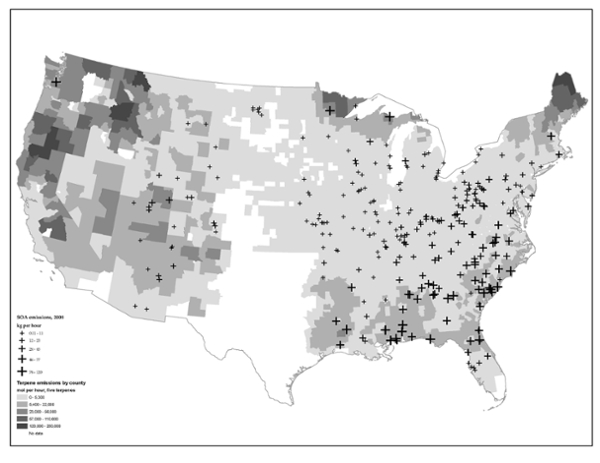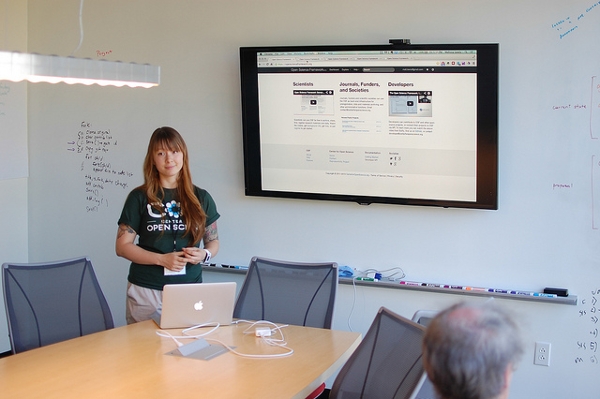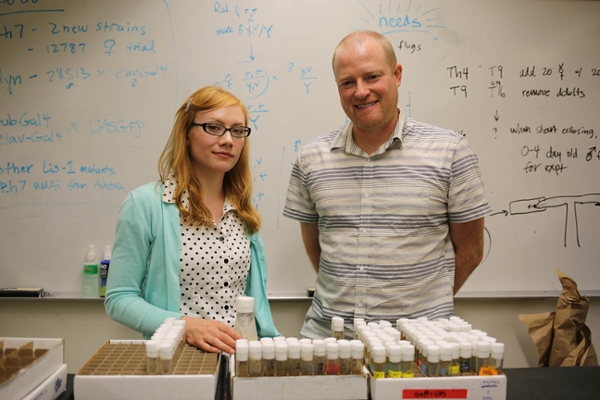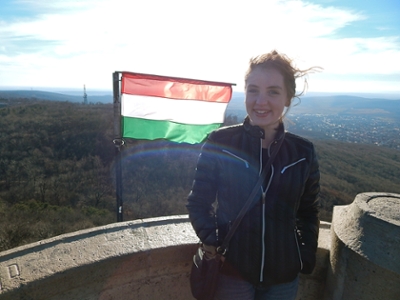
IRIS login | Reed College home Volume 96, No. 2: June 2017
Tags
"undergrad research"
Researchers clear the air on power plant emissions

The Reed team compared SOA emissions (crosses) with terpene emissions (shaded areas) to gain a better understanding of the impact of power plants on air quality,
Government regulators are not measuring the full effect of power plants on air quality, according to a team of Reed researchers, because they fail to account for the interaction of power-plant emissions with natural emissions from a surprising source—trees.
In some cases, the impact of these so-called “secondary organic aerosols” is almost twice as strong as the pollution that is currently measured at the smokestack, calling into question the adequacy of conventional methods for measuring air quality.
The study by Prof. Julie Fry [chemistry and environmental studies], Prof. Chrs Koski [political science and environmental studies], Kristin Bott [Instructional Technology Services], Marisa Hazell ’15, and Raphaela Hsu-Flanders ’16, published in the June 2015 issue of Environmental Science & Policy, shows that the impact of trees on air pollution is much more complicated than you might think.
Continue reading Researchers clear the air on power plant emissions
Study Dashes Bucket of Cold Water on Psychologists

Reed psych major Melissa Lewis ’13 was one of the authors of a groundbreaking study on reproducibility published in the journal Science.
A massive study by 270 researchers, including three Reed psychologists, underscores one of the key challenges facing scientists today: Just how far can you trust scientific research published in professional, peer-reviewed journals?
According to this project, you should take it with a chunk of salt.
The study, published today in Science, set out to examine a core principle of scientific research: the property of reproducibility. Two different researchers should be able to run the same experiment independently and get the same results, whether the field is astrophysics or cell biology. These results form the basis for theories about how the world works, be it the formation of stars or the causes of schizophrenia. Of course, different scientists may offer competing explanations for a particular result—but the result itself is supposed to be reliable.
Continue reading Study Dashes Bucket of Cold Water on Psychologists
Reed biologists show how parasites drive evolution

Reed bio major Shelly Skolfield ’14 and Prof. Todd Schlenke examined swarms of fruit flies (thankfully bottled in vials) to investigate the role of parasites in evolution. The experiment—the first showing that parasitic infection increases recombination in animals—was published in the journal Science. Photo by Tom Humphrey
Parasites are the Rodney Dangerfields of the animal kingdom—they don’t get no respect.
But it turns out that parasitic infection can actually spur evolution and may even be partly responsible for the origin of sexual reproduction, according to a study published in Science by a team of researchers including Shelly Skolfield ’14, Prof. Todd Schlenke [bio 2013–], and colleagues at North Carolina State University.
The researchers found that fruit flies that survived infection by parasites hatched significantly more diverse offspring, presumably to out-evolve the parasites that are trying to exploit them.
Continue reading Reed biologists show how parasites drive evolution
Math Major Zeroes In on Class of ’21 Award

A semester abroad in Hungary got math major Maddie Brandt ’15 interested in the Erdos-Ko-Rado theorem.
Mathematics major Maddie Brandt ’15 has won the illustrious Class of ’21 Award for her senior thesis on the Erdös-Ko-Rado theorem.
The award recognizes “creative work of notable character, involving an unusual degree of initiative and spontaneity.”
Maddie’s thesis carries the rather imposing title “Intersecting Hypergraphs and Decompositions of Complete Uniform Hypergraphs.” Scratching our heads, we turned to Prof. David Perkinson [mathematics 1990–] for an explanation. He wrote:
Continue reading Math Major Zeroes In on Class of ’21 Award

